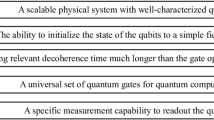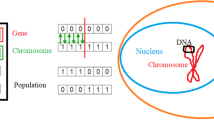Abstract
Performance measures of metaheuristic algorithms assess the quality of a search process by statistically analysing its performance. Such criteria serve two purposes: they provide the verdict on which algorithm is better for what task, and they help applying an algorithm on a given task in the most effective way. The latter goal may be achieved by an appropriate restart strategy of the search process. Furthermore, these criteria are traditionally based on analysis of the search step mean value. Our aim is to elaborate the mean value analysis as well, but via a novel and more general quantile-based analytic approach, which can be used to define new measures. We prove and demonstrate this purpose on three quantile-based performance measures.
Similar content being viewed by others
References
Auger A, Hansen N (2005) Performance evaluation of an advanced local search evolutionary algorithm. In: The 2005 IEEE congress on evolutionary computation, 2005, vol 2, pp 1777–1784. IEEE, 2005
Barrero DF, Muñoz P, Camacho D, R-Moreno MD (2015) On the statistical distribution of the expected run-time in population-based search algorithms. Soft Comput 19(10):2717–2734. ISSN 1433-7479. https://doi.org/10.1007/s00500-015-1672-y
Burkard RE, Karisch SE, Rendl F (1997) Qaplib-a quadratic assignment problem library. J Glob Optim 10(4):391–403
Cerny V (1985) Thermodynamical approach to the traveling salesman problem: an efficient simulation algorithm. J Optim Theory Appl 45(1):41–51
Chen H, Zhu Y, Hu K, He X (2010) Hierarchical swarm model: a new approach to optimization. Discrete Dyn Nat Soc 2010
Feoktistov V (2006) Differential evolution—in search of solutions. Springer, New York
Gendreau M, Potvin J-Y (2010) Handbook of metaheuristics, vol 2. Springer, New York
Golberg DE (1989) Genetic algorithms in search, optimization, and machine learning. Addison-Wesley, Reading
Hansen N, Auger A, Finck S, Ros R (2010) Real-parameter black-box optimization benchmarking 2010: experimental setup
Hilbert D (1933) Ein beitrag zur theorie des legendreschen polynoms. In: Algebra Invariantentheorie Geometrie, pp 367–370. Springer, Berlin
Hoos H, Stützle T (1998) Evaluating las vegas algorithms: pitfalls and remedies. In: Proceedings of the fourteenth conference on uncertainty in artificial intelligence, pp 238–245. Morgan Kaufmann Publishers Inc., Los Altos
Kharroubi F, He J, Tang J, Chen M, Chen L (2015) Evaluation performance of genetic algorithm and tabu search algorithm for solving the max-rwa problem in all-optical networks. J Comb Optim, 30(4):1042–1061. ISSN 1573-2886. https://doi.org/10.1007/s10878-013-9676-y
Neocleous C, Schizas C (2002) Artificial neural network learning: a comparative review. In: Vouros GA, Panayiotopoulos T (eds) Methods and applications of artificial intelligence. Springer, Berlin, pp 300–313
Senthilkumar P, Shahabudeen P (2006) Ga based heuristic for the open job shop scheduling problem. Int J Adv Manuf Technol 30(3–4):297–301
Snyman J (2005) Practical mathematical optimization: an introduction to basic optimization theory and classical and new gradient-based algorithms, vol 97. Springer, New York
Stützle T, Hoos H (2004) Stochastic local search: foundations and applications. Elsevier, Amsterdam
Valsecchi A, Vanneschi L, Mauri G (2014) A study of search algorithms’ optimization speed. J Comb Optim, 27(2):256–270. ISSN 1382-6905. https://doi.org/10.1007/s10878-012-9514-7
Wolpert DH, Macready WG (1997) No free lunch theorems for optimization. IEEE Trans Evol Comput 1(1):67–82
Yang X-S, Deb S (2009) Cuckoo search via lévy flights. In: Nature & biologically inspired computing, 2009. World Congress on NaBIC 2009, pp 210–214. IEEE, 2009
Author information
Authors and Affiliations
Corresponding author
Additional information
This paper was created under the support of Grant SGS14/208/OHK4/3T/14 and SGS17/196/OHK4/3T/14 Czech Technical University in Prague.
Appendix A: MATLAB source code
Appendix A: MATLAB source code


Rights and permissions
About this article
Cite this article
Kukal, J., Mojzeš, M. Quantile and mean value measures of search process complexity. J Comb Optim 35, 1261–1285 (2018). https://doi.org/10.1007/s10878-018-0251-4
Published:
Issue Date:
DOI: https://doi.org/10.1007/s10878-018-0251-4




